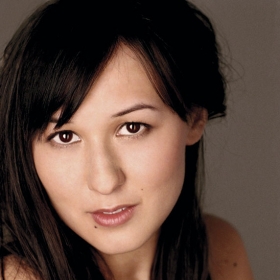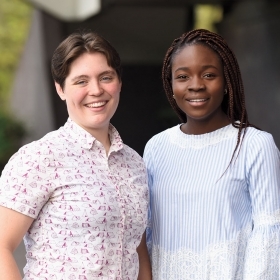Emily Gardner Xu Hall ’10
Emily Gardner Xu Hall ’10 was stunned to win the first Lilly Award for a female composer—which comes with $25,000 and mentorship from Dear Evan Hansen producer Stacey Mindich.

A friend of Emily Gardner Xu Hall ’10 had told her they were going to go network at the Lilly Awards, which honor women in the American theater—and they needed to wear black tie. So in May 2018, Emily borrowed a long, white gown from Rent the Runway and set out to make connections.
“No one was as fancy as me. I was so embarrassed,” Emily says, laughing. I said, ‘Why did you do this to me?’ ”
She was listening to the speeches at the Minetta Lane Theatre in Manhattan when suddenly her name was called, and she was propelled to the stage.
“It was so crazy. I thought I was hallucinating. They had contacted hundreds of my friends—my parents were there, my best friends from college, all the Wellesley Shakers. They had been backstage waiting for an hour.”
In a video of the event, you can see Emily’s shock as she spins around to see so many people she loves. At the podium, a woman says, “Emily Gardner Xu Hall is a composer, who writes from an unapologetically feminist lens.” She explains that Emily has won the first Lilly Award for a female composer—which comes with $25,000 and mentorship from Dear Evan Hansen producer Stacey Mindich. “Go write a musical,” the woman says, to laughter and applause.
Emily is not just a composer. She’s also a lyricist, book writer, and actor. And the Lilly Awards Foundation isn’t alone in recognizing her talent. In March, she won a Jonathan Larsen Grant from the American Theatre Wing, given to emerging composers, lyricists, and book writers, which came with $10,000 and a residency at Northwestern University.
Emily is astonished by and grateful for what she calls “people’s kindness,” especially since she only wrote her first theater work three years ago.
At Wellesley, she double majored in music and English and studied poetry under Frank Bidart and Dan Chiasson. She was also a member of Shakespeare Society and in her senior year she was cast—against her objections—as Hamlet.
“I had told them, ‘I’m too busy, cast me as Fortinbras since he just comes in at the end.’ But it totally changed my life, just unpacking those complex thoughts and beats onstage. If I hadn’t played Hamlet, I wouldn’t have been an actor,” Emily says.
Emily went on to get an M.F.A. in acting at NYU and perform in shows in New York, North Carolina, and Chicago as well as readings and workshops across the country. But she was also writing songs on the side (she’s a trained soprano and pianist, and also plays other instruments, including guitar and violin), and she wanted a way to synthesize music, poetry, and acting.
She settled on writing a musical, even though she had no playwriting experience. But she did have an idea. In grad school, she had played Anya in Chekhov’s The Cherry Orchard three times. Emily calls Anya “a silent ingenue” and says, “I’d notice that after shows, well-meaning people would go up to a male actor and say, ‘Wow, I loved your interpretation of that role,’ and then they would turn to me and say, ‘You looked beautiful in that dress.’”
Emily decided to focus a musical on Anya’s mother, who she believes is gravely misunderstood, and so she wrote the book, music, and lyrics for what she calls a “feminist, multiracial reimagining” of The Cherry Orchard that has yet to have a title —but was staged in four concert performances in 2016 in New York.
The strong reception of that work kicked off a new career writing and creating for the stage. She’s busy with several projects now, ranging from sound design and composing for theater to writing more musicals. It’s important to her that her work includes actors from all genders and races and that it shows women listening to each other.
“Communities of women rise together,” she says. “There are so many supportive women in my life, and you don’t see that on stage. I want to create great roles that women can sink their teeth into that just haven’t existed before.”

